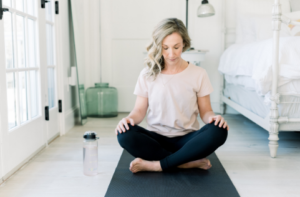Prepare yourselves! We are entering the “diet culture danger zone” as the New Year approaches. I’m sure you’ve noticed by now that there are an abundance of articles and ads that are promising that “this is the year to finally [insert diet-y, body changing resolution here].”
That call to begin a new diet or join a gym can be so tempting, especially when it seems like everyone else is doing it! However, New Year’s resolutions can oftentimes be disguised as just another diet and can completely ignore self care!
It’s been yet another year, and we have STILL yet to see evidence that supports the success of any diet on the market. So, instead of setting a resolution that is centered around changing your body, let’s focus on setting resolutions that promote positive mental health. Here’s to making this year the year of self-care.
Why Focus on Self-Care?
We hear the phrase “self-care” all over the place, but what does it really mean, and why is it so beneficial? Practicing self-care means not only taking care of yourself physically with nutrition, movement, and regular appointments with providers, but it also means taking care of your mental wellbeing by creating space for you to relax and reset.
Practicing self-care has been shown to decrease stress and anxiety, improve energy levels, and reduce frustration and anger.
When it comes to combating diet culture and restoring your relationship with food and your body, it can be exhausting! If you are working 1-1 with one of our dietitians you know that recovery is tough work. That’s why it’s important to take a step back every now and then to create space for yourself.
We understand that beginning a self-care regimen may be daunting. Let’s take a look at some strategies that can help get you started this year.

How to Begin a Self-Care Routine
-
Think about the times that you feel most relaxed
One of the uses of self-care techniques is to help you relax and reset, even if just for a moment or two. Self-care techniques can help to take your mind off of a stressful situation or to simply unwind at the end of the day. So, in order to begin adding to your self-care toolbox, take a second to think about some instances when you were the most relaxed and at-ease. What were you doing in these moments?
-
Reflect on Your Values
Another way to think about things to add to your self-care toolbox is to think about the things that are the most important to you. Chances are, when you do things that align with your core values, you are more likely to feel fulfilled by it.
For example, if you value creativity, think about a way to incorporate art into your self-care regimen. If you value learning, maybe picking up a few books as a way to treat yourself this year.
-
Let Go of Perfectionism
Now, we know that self-care can be a bit glamorized – especially in the age of influencers and curated content. Self-care on Instagram or TikTok is often portrayed as a bubble bath surrounded by candles or an expensive mud mask, but this is rarely what it looks like in real life. (It certainly can – don’t get us wrong).
The truth is, self-care doesn’t always look glamorous. It can be closing your eyes in the middle of the day and taking a few deep breaths to recenter yourself. Or, it can be putting on your old, stained sweatpants when you get home. Try your best not to get caught up in what you believe self-care ~should~ look like, and focus on what makes YOU feel good.
-
Be Flexible
All too often, we hear our clients say, “but I just don’t have time to do anything for myself!” We’re here to challenge that. You do not - we repeat - do not - need an hour, or even 30 minutes a day to practice self care. Sometimes you carve out an hour for yourself and sometimes that time gets interrupted - we get it.
Even taking 5 minutes to do something for yourself can go a long way! Heck, self-care can even look like singing in the car on the way to work. Now that’s what we call multitasking.
- Make a list of self-care ideas
Coming into the new year, begin to make a list of things that help you relax and reset throughout your day or week. This list can grow and evolve as you discover new things that help you feel restored. It’s also okay (and normal!) to scratch things off this list. Sometimes we lose interest in certain self-care tools, or they aren’t as effective for us anymore.
Let this year be the year of an ever changing self-care list. We’ve made a list of suggestions below to help get you started.

Examples of Self-Care
- Try Meditation
We like using apps like Calm or Headspace
2. Connect with a therapist
If you’re having trouble knowing where to start, check out MEDA for eating disorder specialized providers. Our team of dietitians also has a list of specialized therapists that we love working with. Contact us today to learn more!
3. Make a list of books you want to read
Reese Witherspoon’s book club can be a great place to start
4. Get an adequate amount of sleep
We’ve got you covered with this guide to starting a nighttime routine
5. Start a journal
If free writing feels daunting, try looking for a journal with prompts in it, like these
6. Take a walk
Even if it’s a walk around the block or around the office – never underestimate the power of a change of scenery
As we mentioned earlier, self-care can be a crucial part of your journey towards restoring your relationship with food. However, we know that going through this journey alone can be overwhelming. Our team of RDs are here for you! Drop us a line to see how we can best support you in your self care journey.
Comments Off on New Year’s Resolutions: Self Care Edition